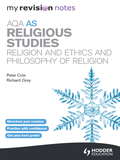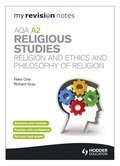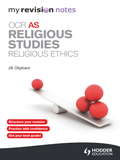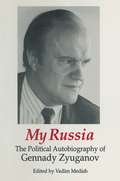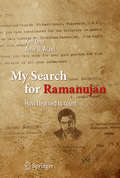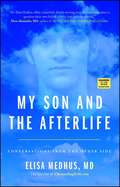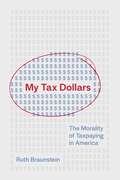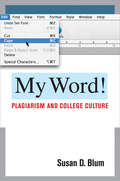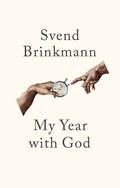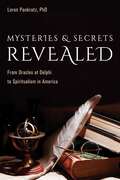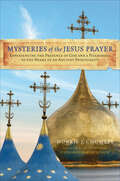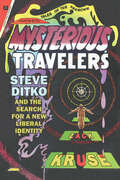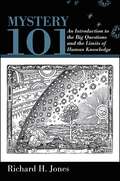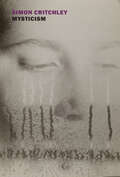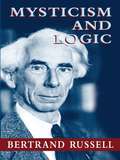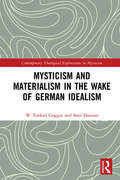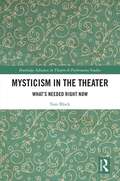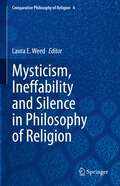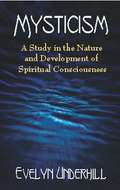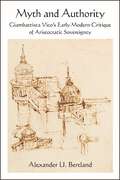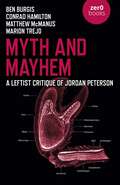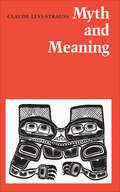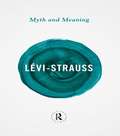- Table View
- List View
My Revision Notes: Religion and Ethics and Philosophy of Religion
by Richard Gray Peter ColeUnlock your full potential with this revision guide which provides both the key content you need to know and guidance on how to apply it for better grades.My Revision Notes: AQA AS Religious Studies: Religion and Ethics and Philosophy of Religion helps you to stay motivated and focused during your revision - and gives you the opportunity to practise and refine your skills to achieve the best grade in your exam. Breaks down all topics into short sections - easy to read and revise from Exam-style practice questions help confidence with the exam 'Issues arising' section specifically helps prepare for AQA AS RS AO2 questions Concise notes, clear layout and colourful features keep you engaged You can check your learning with the 'test yourself' questions and tick-box design
My Revision Notes: Religion and Ethics and Philosophy of Religion
by Richard Gray Peter ColeUnlock your full potential with this revision guide which provides both the key content you need to know and guidance on how to apply it for better gradesMy Revision Notes: AQA A2 Religious Studies: Religion and Ethics and Philosophy of Religion helps you to stay motivated and focused during your revision - and gives you the opportunity to practise and refine your skills to achieve the best grade in your exam. Breaks down all topics into short sections - easy to read and revise from Exam-style practice questions help confidence with the exam 'Issues arising' section specifically helps prepare for AQA AS RS AO2 questions Concise notes, clear layout and colourful features keep you engaged You can check your learning with the 'test yourself' questions and tick-box design
My Revision Notes: Religious Ethics
by Jill OliphantUnlock your full potential with this revision guide which provides both the key content you need to know and guidance on how to apply it for better grades.My Revision Notes: OCR AS Religious Studies: Religious Ethics helps you to stay motivated and focused during your revision - and gives you the opportunity to practise and refine your skills to achieve the best grade in your exam. Breaks down all topics into short sections - easy to read and revise from Exam-style practice questions help confidence with the exam Concise notes, clear layout and colourful features keep you engaged You can check your learning with the 'test yourself' questions and tick-box design
My Russia: The Political Autobiography of Gennady Zyuganov
by Gennady Zyuganov Vadim MedishGennady Andreevich Zyuganov is the leader of Russia's resurgent Communist Party and was Boris Yeltsin's strongest challenger in the summer 1996 presidential elections. Although his face became familiar to the world at that time, his ideas and his programme were mainly a subject of speculation. A former village teacher from Orel Province, Zyuganov came to Moscow in the 1980s to work in the ideology department of the Communist Party of the Soviet Union and to complete doctoral work in philosophy at Moscow State University. He is a prolific writer who has rebuilt the Communist Party on his vision of a Russian socialist great power. Today he leads the Communist faction in the Duma and is chairman of the united opposition movement - the National Patriotic Union. This volume is a compilation of Zyuganov's writings on Russia's past and present and her place in the world; Russia's fate under the new leadership of Gorbachev and Yeltsin; his own vision of Russia's future under a new Communist leadership; and his reflections on the 1996 presidential election of the Communist Party of the Russian Federation.
My Search for Ramanujan
by Amir D. Aczel Ken Ono"The son of a prominent Japanese mathematician who came to the United States after World War II, Ken Ono was raised on a diet of high expectations and little praise. Rebelling against his pressure-cooker of a life, Ken determined to drop out of high school to follow his own path. To obtain his father's approval, he invoked the biography of the famous Indian mathematical prodigy Srinivasa Ramanujan, whom his father revered, who had twice flunked out of college because of his single-minded devotion to mathematics. Ono describes his rocky path through college and graduate school, interweaving Ramanujan's story with his own and telling how at key moments, he was inspired by Ramanujan and guided by mentors who encouraged him to pursue his interest in exploring Ramanujan's mathematical legacy. Picking up where others left off, beginning with the great English mathematician G. H. Hardy, who brought Ramanujan to Cambridge in 1914, Ono has devoted his mathematical career to understanding how in his short life, Ramanujan was able to discover so many deep mathematical truths, which Ramanujan believed had been sent to him as visions from a Hindu goddess. And it was Ramanujan who was ultimately the source of reconciliation between Ono and his parents. Ono's search for Ramanujan ranges over three continents and crosses paths with mathematicians whose lives span the globe and the entire twentieth century and beyond. Along the way, Ken made many fascinating discoveries. The most important and surprising one of all was his own humanity. "
My Son and the Afterlife: Conversations from the Other Side
by Elisa Medhus M.D.Love knows no boundaries—not even death. An emotional journey through a mother&’s grief to healing and a doctor&’s skepticism to belief—discover the answers that changed one woman&’s life forever, and may just change yours, too.Are you not sure of what awaits you after death? Dr. Elisa Medhus wasn&’t either, having never believed in life after death. As an accomplished physician, she placed her faith in science. All of those beliefs changed after her son Erik took his own life and then reached out to her from the other side. Intimate, heartbreaking, and illuminating, this is an incredible journey from grief and skepticism to healing and belief in the afterlife. Based on Medhus&’s wildly popular blog, Channeling Erik, My Son and the Afterlife is a story that is as painful as it is uplifting—depicting a mother&’s healing journey as she discovers that Erik is still with her. Erik speaks from the other side with candor, wisdom, and depth as he describes his own experiences and provides new answers about the nature of souls, death, and the afterlife—answers that have the potential to change our lives forever. *Content warning: Please note that there is some explicit language present in this book
My Tax Dollars: The Morality of Taxpaying in America
by Ruth BraunsteinWhen the mundane reality of paying taxes takes on moral significanceIn My Tax Dollars, Ruth Braunstein maps the contested moral landscape in which Americans experience and make sense of the tax system. Braunstein tells the stories of Americans who view taxpaying as more than a mundane chore: antigovernment tax defiers who challenge the legitimacy of the tax system, antiwar activists who resist the use of their taxes to fund war, antiabortion activists against &“taxpayer funded abortions,&” and a diverse group of people who promote taxpaying as a moral good.Though taxpaying is often portrayed as dull and technical, exposure to collective rituals, civic education, propaganda, and protest transforms the practice for many Americans into either a sacred rite of citizenship or a profane threat to what they hold dear. These sacred and profane meanings can apply to the act of taxpaying itself or to the specific uses of tax dollars. Despite intense disagreement about these meanings, politically diverse Americans engaged in both taxpaying and tax resistance valorize the individual taxpayer and &“my tax dollars.&”Braunstein explores the profound implications of this meaning making for tax consent, the legitimacy of the tax system, and citizens&’ broader understandings of their political relationships. Going beyond the usual focus on tax policy, Braunstein&’s innovative view of taxation through the lens of cultural sociology shows how citizens in value-diverse societies coalesce around shared visions of the sacred and fears of the profane.
My Word!: Plagiarism and College Culture
by Susan D. Blum"Classroom Cheats Turn to Computers." "Student Essays on Internet Offer Challenge to Teachers." "Faking the Grade." Headlines such as these have been blaring the alarming news of an epidemic of plagiarism and cheating in American colleges: more than 75 percent of students admit to having cheated; 68 percent admit to cutting and pasting material from the Internet without citation. Professors are reminded almost daily that many of today's college students operate under an entirely new set of assumptions about originality and ethics. Practices that even a decade ago would have been regarded almost universally as academically dishonest are now commonplace. Is this development an indication of dramatic shifts in education and the larger culture? In a book that dismisses hand-wringing in favor of a rich account of how students actually think and act, Susan D. Blum discovers two cultures that exist, often uneasily, side by side in the classroom.Relying extensively on interviews conducted by students with students, My Word! presents the voices of today's young adults as they muse about their daily activities, their challenges, and the meanings of their college lives. Outcomes-based secondary education, the steeply rising cost of college tuition, and an economic climate in which higher education is valued for its effect on future earnings above all else: These factors each have a role to play in explaining why students might pursue good grades by any means necessary. These incentives have arisen in the same era as easily accessible ways to cheat electronically and with almost intolerable pressures that result in many students being diagnosed as clinically depressed during their transition from childhood to adulthood.However, Blum suggests, the real problem of academic dishonesty arises primarily from a lack of communication between two distinct cultures within the university setting. On one hand, professors and administrators regard plagiarism as a serious academic crime, an ethical transgression, even a sin against an ethos of individualism and originality. Students, on the other hand, revel in sharing, in multiplicity, in accomplishment at any cost. Although this book is unlikely to reassure readers who hope that increasing rates of plagiarism can be reversed with strongly worded warnings on the first day of class, My Word! opens a dialogue between professors and their students that may lead to true mutual comprehension and serve as the basis for an alignment between student practices and their professors' expectations.
My Year with God
by Svend BrinkmannHow are Christians capable of believing? Is it faith or delusion? Or is there something wrong with me? I do not believe in spirits, gods, miracles, resurrection or eternal life. But I will seek to cast off my prejudices and give God a chance. At least for a year. Danish writer Svend Brinkmann spent a year with God, exploring faith and religion through the eyes of a sceptic. Each month, from January to December, he grappled with questions that had nagged at him since he was a child: Why does God let the innocent suffer? Does science disprove the existence of God? Does faith make you a better person? Can you doubt and still believe? It became a year of deep reflection and surprising revelations that challenged the bounds of his scientific worldview and led him to a new appreciation of faith and its place within a secular, mostly fulfilled life.
Mysteries and Secrets Revealed: From Oracles at Delphi to Spiritualism in America
by Loren Pankratz Ph.DMysteries and Secrets Revealed uncovers the reality behind mysteries of nature and secrets of frauds that eluded common understanding. The journey begins in the ancient Greek city of Delphi, where priests claimed the gift of a priceless gold lion was an acknowledgement of their clairvoyant powers. But their concocted story concealed an embarrassing blunder. Those sufficiently savvy to catch the lie became aware of even deeper problems. Author Loren Pankratz then guides us through the conflicts of Renaissance scholars, including Galileo who explained things in ways that enraged philosophers and infuriated priests. Galileo's methods of investigation were perpetuated by the meticulous work of the Academy of Experiment, and Bernard Fontenelle's enthralling dialogue enabled common people to accept life in the rearranged sun-centered universe. Clairvoyants in a mesmeric trance claimed they could visit distant planets and endure brutal surgical procedures. If any of this was real, how was it possible? One nineteenth century mesmeric savant, Alexis Didier, was so convincing that someone claimed no case of clairvoyance could be made for anyone if his accomplishments were not real. This unchallenged declaration is now unraveled here for the first time through information gleaned from uncommon documents and rare antiquarian pamphlets. The surprising manifestations of modern spiritualism quickly escalated into a psychic arms race that included mysterious tipping and turning of tables. Scientist Michael Faraday devised ingenious experiments to show how subtle muscle reactions outside of awareness created these manifestations. On the other hand, explanations for table levitations and mysterious writing on slates could only be solved by individuals with acute observational skills and acquainted with the methods of trickery.Each story in Mysteries and SecretsRevealed captures the tension of conflict, the thrill of discovery, and the strategies of science that unmasked frauds, fakes, false belief, and the enigmas of our natural world.
Mysteries of the Jesus Prayer: Experiencing the Mysteries of God and a Pilgrimage to the Heart of an Ancient Spirituality
by Norris Chumley“Norris Chumley traverses a spiritual landscape unfamiliar to most Westerners. . . . Take this book and read. Even better, read this book and accept its invitation to pray.” —Diana Butler Bass, author of A People's History of Christianity Norris Chumley presents a lavishly illustrated companion to the PBS documentary Mysteries of the Jesus Prayer. Readers can follow Chumley on a pilgrimage through the holiest sites of the early Christian world as he searches for modern-day practitioners of the ancient Eastern mystical tradition and its most sacred prayer: "Lord Jesus Christ, Son of God, have mercy on me, a sinner." This beautifully illustrated volume includes black-and-white and full-color images of the author's travels through Eastern Europe, including rare pictures from visits to holy sites where photographers are only rarely granted access.
Mysterious Travelers: Steve Ditko and the Search for a New Liberal Identity (Great Comics Artists Series)
by Zack KruseSteve Ditko (1927–2018) is one of the most important contributors to American comic books. As the cocreator of Spider-Man and sole creator of Doctor Strange, Ditko made an indelible mark on American popular culture. Mysterious Travelers: Steve Ditko and the Search for a New Liberal Identity resets the conversation about his heady and powerful work. Always inward facing, Ditko’s narratives employed superhero and supernatural fantasy in the service of self-examination, and with characters like the Question, Mr. A, and Static, Ditko turned ordinary superhero comics into philosophic treatises. Many of Ditko’s philosophy-driven comics show a clear debt to ideas found in Ayn Rand’s Objectivism. Unfortunately, readers often reduce Ditko’s work to a mouthpiece for Rand’s vision. Mysterious Travelers unsettles this notion. In this book, Zack Kruse argues that Ditko’s philosophy draws on a complicated network of ideas that is best understood as mystic liberalism. Although Ditko is not the originator of mystic liberalism, his comics provide a unique window into how such an ideology operates in popular media. Examining selections of Ditko’s output from 1953 to 1986, Kruse demonstrates how Ditko’s comics provide insight into a unique strand of American thought that has had a lasting impact.
Mystery 101: An Introduction to the Big Questions and the Limits of Human Knowledge
by Richard H. JonesOffering readers much to ponder, Richard H. Jones approaches the "big questions" of philosophy such as the nature of reality, consciousness, free will, the existence of God, and the meaning of life not by weighing the merits of leading arguments in these debates, but instead by questioning the extent to which we are even in a position to answer such questions in the first place. Regardless of continuous technical and even groundbreaking advances in knowledge, there will always be gaps in what we can fully understand. Distinguishing true mysteries from problems yet to be solved but within the scope of our intellectual grasp, Jones provides a penetrating and high-level overview of the scope and limits of scientific and philosophical inquiry.
Mysticism
by Simon CritchleyA probing, inspiring exploration of mysticism not as religious practice but as a mode of experience and way of life by one of the most provocative philosophical thinkers of our time.Why mysticism? It has been called &“experience in its most intense form,&” and in his new book the philosopher Simon Critchley poses a simple question to the reader: Wouldn&’t you like to taste this intensity? Wouldn&’t you like to be lifted up and out of yourself into a sheer feeling of aliveness, both your life and those of the creatures that surround you? If so, it might be well worthwhile trying to learn what is meant by mysticism and how it can shift, elevate, and deepen the sense of our lives. Mysticism is not primarily a theoretical issue. It's not a question of religious belief but of felt experience and daily practice. A rough and ready definition of mysticism is that it is a way of systematically freeing yourself of your standard habits, your usual fancies and imaginings so as to see what is there and stand with what is there ecstatically. Mysticism is the practical possibility of the achievement of a fluid openness between thought and existence. This is a book about trying to get outside oneself, to lose oneself, while knowing that the self is not something that can ever be fully lost. It is also a book about Julian of Norwich, Anne Carson, Annie Dillard, T.S. Eliot, and Nick Cave. It shows how listening to music can be secular worship. It is a book full of learning, puzzlement, pleasure, and wonder. It opens the door to mysticism not as something unworldly and unimaginable, but as a way of life.
Mysticism and Logic
by Bertrand Russell10 brilliant essays by a Nobel Prize-winning philosopher challenge romantic mysticism and promote a scientific view of society and nature. Russell explains his theory of logical atomism in these witty, cogent writings, which include popular treatments of religious and educational issues as well as more technical examinations of problems of logic.
Mysticism and Logic (Routledge Classics)
by Bertrand Russell“To abandon the struggle for private happiness, to expel all eagerness of temporary desire, to burn with passion for eternal things – this is emancipation, and this is the free man's worship.” —Bertrand RussellMysticism and Logic is one of Russell's most celebrated collection of essays. They not only set the tone for analytical philosophy in the English-speaking world but are Russell's first proper foray into the role of public philosopher, one he would occupy for years to come. Both scientific and romantic, Russell explores and unpacks, in his inimitable pellucid prose, some of the thorniest problems and puzzles in philosophy. These include different ways of knowing something, the foundations of mathematics, the ultimate nature of matter and whether, in Russell's view, we should seek a philosophical theory of causation.Taken together, they show the considerable changes that occurred in Russell's thinking during the years he was producing some of his best philosophy, leading up to World War One. Also included is Russell's renowned essay 'A Free Man's Worship', where he argues that we can construct a deeper form of faith based on the power of reason for those who wish to be free.This Routledge Classics edition includes a new Foreword by Bernard Linsky.
Mysticism and Materialism in the Wake of German Idealism (Contemporary Theological Explorations in Mysticism)
by Sean Hannan W. Ezekiel GogginThis book argues that the rediscovery of mystical theology in nineteenth-century Germany not only helped inspire idealism and romanticism, but also planted the seeds of their overcoming by way of critical materialism. Thanks in part to the Neoplatonic turn in the works of J. G. Fichte, as well as the enthusiasm of mining engineer Franz X. von Baader, mystical themes gained a critical currency, and mystical texts returned to circulation. This reawakening of the mystical tradition influenced romantic and idealist thinkers such as Novalis and Hegel, and also shaped later critical interventions by Marx, Benjamin, and Bataille. Rather than rehearsing well-known connections to Swedenborg or Böhme, this study goes back further to the works of Meister Eckhart, Nicholas of Cusa, Catherine of Siena, and Angela of Foligno. The book offers a new perspective on the reception of mystical self-interrogation in nineteenth-century German thought and will appeal to scholars of philosophy, history, theology, and religious studies.
Mysticism in the Theater: What’s Needed Right Now (Routledge Advances in Theatre & Performance Studies)
by Tom BlockMysticism in the Theater introduces theater makers to the power and possibility of using historical mystical ideas to influence all aspects of a production. Historical mysticism represents ideas developed by recognized spiritual thinkers in all religions and time periods: individuals who stilled their ego, and perceived the unity of all, hidden within the apparent multiplicity of existence. This unique manner of spiritual inlay allows theatrical presentations to find the height of artistic expression: art at the intersection of our historical moment and the eternal. This study introduces theater makers to the history of mystical inspiration within performance work and develops strategies for inserting mystical ideas into their productions. The book ties this model into theatre’s history, as mystical ideas and quotes have been inserted into productions from Greek theatre through Shakespeare and into the present day. This book explores how teachings and ideas of specific historical mystical thinkers might influence all aspects of contemporary theatrical productions including writing, directing, acting, stagecraft/set design, lighting design, costume design, sound design, and choreography.
Mysticism, Ineffability and Silence in Philosophy of Religion (Comparative Philosophy of Religion #4)
by Laura E. WeedThe authors in this volume explore a wide variety of the contemporary approaches to mystical and religious experience to elucidate what religious experience is, in its own terms, and how its practitioners understand it. This anthology features contributions that point out that contemporary studies of consciousness, sociology, hermeneutics, neuroscience, medicine, and other fields, are revealing that there is much more to be said for the inner life of a human’s consciousness than reductionists and behaviorists will allow.This book is one of very few that primarily takes the stance of academic practitioners, explaining their own experience, rather than that of academics trying to explain the phenomena away, as really politics, or sociology, or delusion, or psychological pathology, or literary flights of fancy, or an aberration of any of the other academic fields. Most of the authors in this volume embrace the task of explaining and analyzing religious experience, mysticism, and the healing power of silence and presence, using the resources of all of the academic disciplines, as appropriate. The essays contained analyze religious, and non-religious, mystical and profoundly personal experiences across several world religions, and in areas such as art and music, as well as in solving personal crises such as family disruption and patriarchal oppression. The authors address the subject matter through analyses of the frequent and destructive failures of language, or just noise, to capture or express the nuances of the inner life of a person. It is this very ineffability of self that renders the spiritual, emotional and interior life of individuals beyond cognition and perception, of the straightforward sorts embraced by most cognitive disciplines. The contributors come from a variety of cross-disciplinary fields to bring forth the possibilities for an intuitive and creative, rich and growing inner life for a human. This text appeals to students, researchers, and practitioners.
Mysticism: A Study in the Nature and Development of Spiritual Consciousness
by Evelyn UnderhillMysticism is usually thought of as an intense state involving personal unification with the Divine or Ultimate Reality. By its very nature, it is an ineffable experience, impossible to put into words. It is not impossible, however, to study the phenomenon, with an eye toward understanding not only its nature and manifestations, but its relationship to spirituality in general. This book is such a study. Widely considered the best book on mysticism for the general reader, this classic volume assembles a broad range of information scattered among monographs and textbooks in many languages.The work of a noted British authority on mysticism, it is divided into two parts: the first provides an introduction to the general subject of mysticism and its relation to metaphysics, psychology, theology, magic, and symbolism. The second and longer part contains a detailed study of the nature and development of spiritual or mystical consciousness, including such topics as the awakening of the self, the purification of the self, voices and visions, introversion, ecstasy and rapture, the dark night of the soul, and the unitive life. An interesting appendix provides a historical sketch of European mysticism from the beginning of the Christian era to the death of Blake.Richly documented with material drawn from such great mystics as St. Teresa, Meister Eckhart, St. John of the Cross, and William Blake, this remarkable study will be of immense interest to students, psychologists, theologians — anyone interested in this extremely personal and powerful form of spiritual life.
Mysticism: Christian and Buddhist
by Daisetz Teitaro SuzukiDrawing parallels and noting disparities, the author contrasts the mystic qualities between Christianity -- as expressed in the writings of Meister Eckhart (1260-1326), an unconventional ecclesiastic who encouraged transcendence of traditional faith -- and Buddhism, explicating the views of both on such concepts as infinity, eternity, and the transmigration of souls.
Myth and Authority: Giambattista Vico's Early Modern Critique of Aristocratic Sovereignty (SUNY series in Contemporary Italian Philosophy)
by Alexander U. BertlandLiving in a province dominated by powerful oligarchs, Giambattista Vico (1668–1744) concluded that political philosophy should work to undermine aristocratic authority and prevent political devolution into feudalism. Rejecting the possibility that the free market could successfully instill civil behavior, he advocated for a strong central judicial system to work closely with citizens to promote stability and justice. This study puts Vico in conversation with other Enlightenment thinkers such as Locke, Rousseau, and Mandeville to show how his alternative warrants serious consideration. In contrast to scholars who read Vico's New Science as a defense of the imagination, this study casts his account of poetic wisdom politically as an epistemological critique of the aristocratic mentality. Myth and Authority argues that Vico's depiction of pagan religion is a refined attempt to explain how oligarchy maintains its stranglehold on power. While Western civilization did not follow the path Vico suggested, it may now be more relevant as concerns grow about the increasing influence of the wealthy on civil institutions.
Myth and Mayhem: A Leftist Critique of Jordan Peterson
by Matthew McManus Ben Burgis Conrad Bongard Hamilton Marion TrejoJordan Peterson rocketed to fame in the 2010s and has preached on everything from the evils of postmodern neo-Marxism to the mating habits of lobsters ever since then. The Left has since leveled many criticisms about the Canadian psychologist, characterizing him as everything from an apologist for the alt-right to simply not being interesting or profound. Myth and Mayhem: A Leftist Critique of Jordan Peterson is intended as a comprehensive critical look at all aspects of his thought, from the philosophical depths to the mundane heights. Written by four authors who each look at a different element of his thought, it shows why taking Peterson seriously doesn't mean embracing him. Includes an introduction by Slavoj Zizek
Myth and Meaning
by Claude Lévi-StraussEver since the rise of science and the scientific method in the seventeenth century, we have rejected mythology as the product of superstitious and primitive minds. Only now are we coming to a fuller appreciation of the nature and role of myth in human history. In these five lectures originally prepared for the CBC, Claude Lévi-Strauss, one of the world's greatest living thinkers, offers the insights of a lifetime spent interpreting myths and trying to discover their significance for human understanding. The lectures begin with a discussion of the historical split between mythology and science and the evidence that mythic levels of understanding are being reintegrated in our approach to knowledge. In an extension of his theme, Professosr Lévi-Strauss analyses what we have called 'primitive' thinking and discusses some universal features of human mythology. The final two lectures outline the functional relationship between mythology and history and the structural relationship between mythology and music. Combining history, anthropology, and philosophy, this book provides a broad and penetrating perspective on the contemporary western world.
Myth and Meaning (Routledge Great Minds)
by Claude Lévi-StraussThe anthropologist Claude Levi-Strauss was one of the greatest intellectuals of the twentieth century. His work has had a profound impact not only within anthropology but also linguistics, sociology and philosophy. In this short book he examines the nature and role of myth in human history, distilling a lifetime of writing into a few sharp insights. It is a crystalline overview of many of the basic ideas underlying his work, including the theory of structuralism and the difference between 'primitive' and 'scientific' thought and shows why Levi-Strauss remains a hugely important intellectual figure. With a new foreword by Patrick Wilcken.
